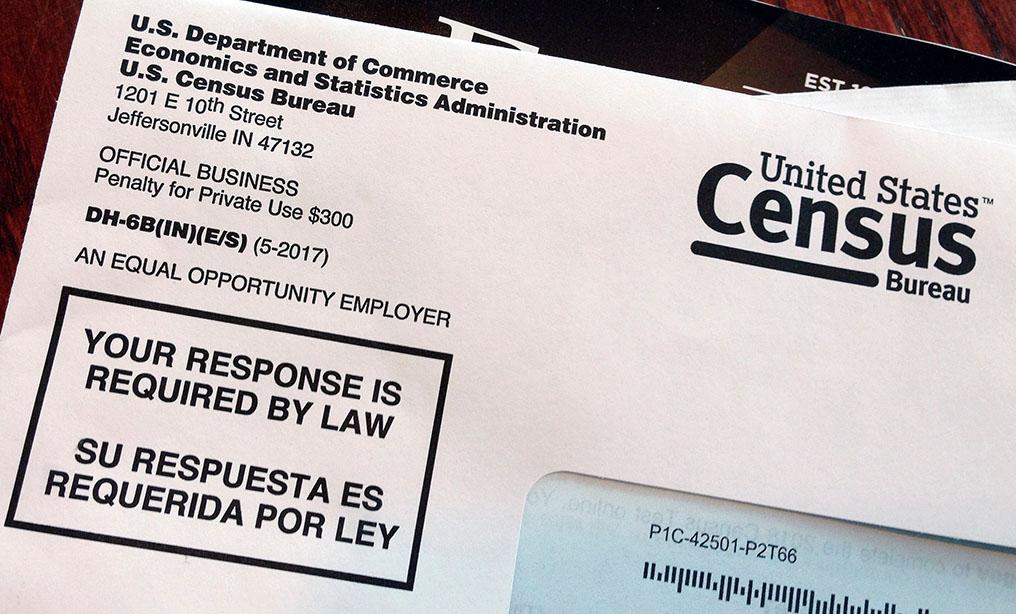Judge Refuses White House Stay of Discovery in Census Lawsuit
U.S. District Judge Jesse Furman of the Southern District of New York said Friday afternoon that discovery should go forward as scheduled, including a deposition of Acting Assistant Attorney General for Civil Rights John Gore.
September 07, 2018 at 05:19 PM
4 minute read
The original version of this story was published on New York Law Journal
 An envelope containing a 2018 census letter mailed to a resident in Providence, R.I., as part of the nation's only test run of the 2020 Census. Photo: Michelle R. Smith/AP
An envelope containing a 2018 census letter mailed to a resident in Providence, R.I., as part of the nation's only test run of the 2020 Census. Photo: Michelle R. Smith/AP
A federal judge has denied a motion from the Trump administration to stay discovery in state Attorney General Barbara Underwood's lawsuit over a question about citizenship on the 2020 U.S. Census.
 Judge Furman. Photo: Rick Kopstein/NYLJ
Judge Furman. Photo: Rick Kopstein/NYLJU.S. District Judge Jesse Furman of the Southern District of New York said in a decision Friday afternoon that discovery should go forward as scheduled, including a deposition of Acting Assistant Attorney General for Civil Rights John Gore. That deposition is scheduled for Sept. 12.
The Trump administration moved to stay discovery on the Friday before Labor Day weekend, which Furman took note of on three separate occasions in the decision. They were seeking to pause all discovery in the case, but particularly the deposition of Gore, Furman said.
Gore's deposition could help Underwood get to the root of how the U.S. Department of Commerce decided to add a question about citizenship to the next census. Gore allegedly ghostwrote a letter from Department of Justice to Commerce Secretary Wilbur Ross asking that the question be added, Furman said.
Underwood and 17 other attorneys general are suing the Trump administration for adding the question earlier this year. They claimed in their lawsuit, filed in April, that asking about citizenship will decrease turnout for the census in states with large immigrant populations, like New York. That could cause those states to lose representatives in Congress and the Electoral College, and a smaller recorded population could also mean less federal funding in areas like education and health care, the attorneys general argued.
Furman said in a July decision that there was “strong” evidence the Trump administration acted in bad faith when deciding to add the citizenship question. That decision also advanced discovery in the case, which Underwood's office has been conducting since that time.
That's one reason Furman denied the Trump administration's motion to stay discovery on Friday. He said there clearly wasn't evidence of irreparable harm to support their motion when they waited so long to file it.
“Defendants waited nearly two full months to seek a stay of the court's ruling (and even then filed their motion at 6 p.m. on the eve of a three-day weekend)—during which time the parties conducted substantial discovery,” Furman wrote in his decision. “That delay, in itself, belies defendants' conclusory assertions of irreparable harm.”
Furman also rejected the Trump administration's argument that he used an incorrect legal standard to determine bad faith in the July decision. Furman rebutted that argument, saying the administration had actually used an incorrect standard in asserting their claim, which was slim on evidence, he said.
Furman also said in a case as time-sensitive as this one, with the census coming up in less than two years, any delay could go against the public interest.
“Given the importance of the census and the need for a timely resolution of plaintiffs' claims, staying discovery altogether will substantially injure both plaintiffs and the public interest,” Furman wrote.
Furman denied the administration's request to stay Gore's deposition separately, citing the same reasons.
“Put simply, a deposition of the person who apparently wrote the memorandum that Secretary Ross himself requested and then later relied on to justify his decision to add the citizenship question is highly relevant 'to assessing the commerce secretary's reasons,'” Furman wrote.
Underwood is leading the lawsuit along with attorneys general from Connecticut, Delaware, Illinois, Iowa, Maryland, Massachusetts, Minnesota, New Jersey, New Mexico, North Carolina, Oregon, Pennsylvania, Rhode Island, Virginia, Vermont, Washington and the District of Columbia.
Kate Bailey is the lead attorney from the Department of Justice representing the Trump administration. A spokesman from the Census Bureau, which is within the Commerce Department, did not immediately respond to a request for comment.
READ MORE:
Underwood Promises Lawsuit Over EPA's Latest Obama-Era Rollback
Underwood, Coalition of State AGs Promise Lawsuit Over EPA's Fuel Efficiency Rollback
This content has been archived. It is available through our partners, LexisNexis® and Bloomberg Law.
To view this content, please continue to their sites.
Not a Lexis Subscriber?
Subscribe Now
Not a Bloomberg Law Subscriber?
Subscribe Now
NOT FOR REPRINT
© 2025 ALM Global, LLC, All Rights Reserved. Request academic re-use from www.copyright.com. All other uses, submit a request to [email protected]. For more information visit Asset & Logo Licensing.
You Might Like
View All
Litigators of the Week: A Knockout Blow to Latest FCC Net Neutrality Rules After ‘Loper Bright’

An ‘Indiana Jones Moment’: Mayer Brown’s John Nadolenco and Kelly Kramer on the 10-Year Legal Saga of the Bahia Emerald

Litigators of the Week: A Win for Homeless Veterans On the VA's West LA Campus

'The Most Peculiar Federal Court in the Country' Comes to Berkeley Law
Trending Stories
Who Got The Work
J. Brugh Lower of Gibbons has entered an appearance for industrial equipment supplier Devco Corporation in a pending trademark infringement lawsuit. The suit, accusing the defendant of selling knock-off Graco products, was filed Dec. 18 in New Jersey District Court by Rivkin Radler on behalf of Graco Inc. and Graco Minnesota. The case, assigned to U.S. District Judge Zahid N. Quraishi, is 3:24-cv-11294, Graco Inc. et al v. Devco Corporation.
Who Got The Work
Rebecca Maller-Stein and Kent A. Yalowitz of Arnold & Porter Kaye Scholer have entered their appearances for Hanaco Venture Capital and its executives, Lior Prosor and David Frankel, in a pending securities lawsuit. The action, filed on Dec. 24 in New York Southern District Court by Zell, Aron & Co. on behalf of Goldeneye Advisors, accuses the defendants of negligently and fraudulently managing the plaintiff's $1 million investment. The case, assigned to U.S. District Judge Vernon S. Broderick, is 1:24-cv-09918, Goldeneye Advisors, LLC v. Hanaco Venture Capital, Ltd. et al.
Who Got The Work
Attorneys from A&O Shearman has stepped in as defense counsel for Toronto-Dominion Bank and other defendants in a pending securities class action. The suit, filed Dec. 11 in New York Southern District Court by Bleichmar Fonti & Auld, accuses the defendants of concealing the bank's 'pervasive' deficiencies in regards to its compliance with the Bank Secrecy Act and the quality of its anti-money laundering controls. The case, assigned to U.S. District Judge Arun Subramanian, is 1:24-cv-09445, Gonzalez v. The Toronto-Dominion Bank et al.
Who Got The Work
Crown Castle International, a Pennsylvania company providing shared communications infrastructure, has turned to Luke D. Wolf of Gordon Rees Scully Mansukhani to fend off a pending breach-of-contract lawsuit. The court action, filed Nov. 25 in Michigan Eastern District Court by Hooper Hathaway PC on behalf of The Town Residences LLC, accuses Crown Castle of failing to transfer approximately $30,000 in utility payments from T-Mobile in breach of a roof-top lease and assignment agreement. The case, assigned to U.S. District Judge Susan K. Declercq, is 2:24-cv-13131, The Town Residences LLC v. T-Mobile US, Inc. et al.
Who Got The Work
Wilfred P. Coronato and Daniel M. Schwartz of McCarter & English have stepped in as defense counsel to Electrolux Home Products Inc. in a pending product liability lawsuit. The court action, filed Nov. 26 in New York Eastern District Court by Poulos Lopiccolo PC and Nagel Rice LLP on behalf of David Stern, alleges that the defendant's refrigerators’ drawers and shelving repeatedly break and fall apart within months after purchase. The case, assigned to U.S. District Judge Joan M. Azrack, is 2:24-cv-08204, Stern v. Electrolux Home Products, Inc.
Featured Firms
Law Offices of Gary Martin Hays & Associates, P.C.
(470) 294-1674
Law Offices of Mark E. Salomone
(857) 444-6468
Smith & Hassler
(713) 739-1250






